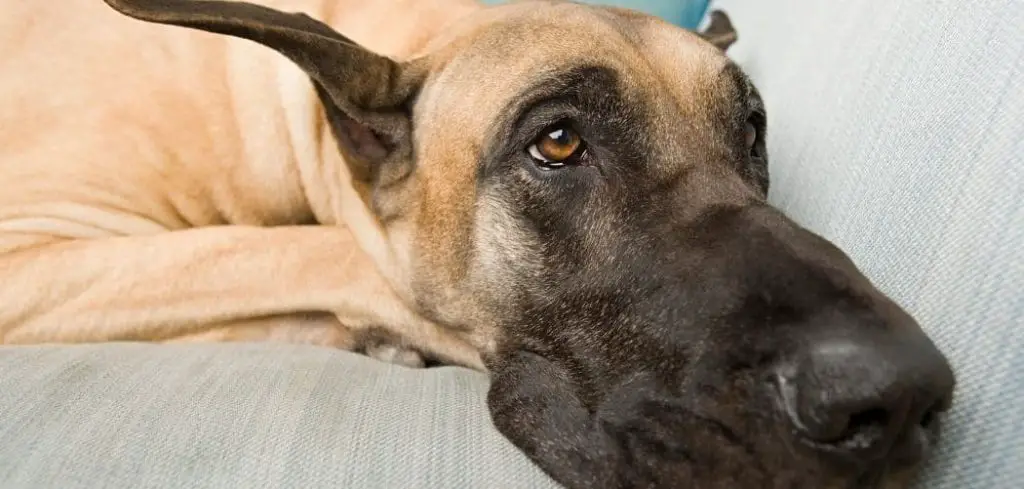If your dog has had loose stool for a week, it’s a sign that something more than a simple stomach upset could be going on. Persistent diarrhea in dogs can cause dehydration, nutrient loss, and indicate an underlying health problem that needs attention.
We outline the common causes of a dog having loose stool for a week, what you can do at home, and when to seek veterinary help.
Table of Contents
Dog Loose Stool For a Week — Why It Happens
A dog having loose stool for a week is not normal and usually signals an ongoing issue and it may be caused by parasites, food intolerances, infections, inflammatory bowel disease, or organ-related problems. Sometimes, stress or medication can also prolong diarrhea, especially if your dog has recently undergone a change in routine or treatment.
Chronic loose stool needs more than just waiting it out, as long-term diarrhea can quickly weaken your dog.

Dog Loose Stool For a Week: Common Causes
Parasites
Intestinal parasites such as giardia, hookworms, or whipworms are common causes of long-lasting diarrhea.
These organisms irritate the intestines and prevent proper nutrient absorption. Dogs with parasites may have mucus in their stool, weight loss, and a dull coat in addition to diarrhea. Left untreated, the parasites can cause serious weakness and dehydration.
Read more: Dog Loose Stool After Surgery (Here’s what it could mean)
Food Intolerance or Allergies
Food sensitivities often lead to prolonged loose stools. A dog that cannot properly digest certain proteins, grains, or additives may experience chronic digestive upset.
Owners often notice the diarrhea gets worse after certain meals. Over time, this can result in poor weight gain, skin issues, or frequent paw licking along with stomach trouble.
Bacterial or Viral Infections
Infections like salmonella, E. coli, or parvovirus can lead to extended bouts of loose stool.
While mild cases may resolve on their own, more serious infections linger and cause dehydration, fever, or even blood in the stool.
Puppies and older dogs are particularly vulnerable, and a week of symptoms usually means the infection is not resolving naturally.
Inflammatory Bowel Disease (IBD)
IBD is a chronic condition where the immune system overreacts in the intestines, leading to inflammation and poor absorption of nutrients.
Dogs with IBD often have loose stool for weeks at a time, sometimes alternating with periods of normal stool. Vomiting, weight loss, and decreased appetite often occur as well. This condition requires veterinary management for long-term control.
Pancreatic Disorders
The pancreas helps digest food, and when it isn’t functioning correctly—such as in exocrine pancreatic insufficiency (EPI) or pancreatitis—dogs develop chronic diarrhea.
Loose stool in these cases often appears greasy or has a foul odor. Dogs may also lose weight rapidly despite eating more food than usual.
Stress or Medication Side Effects
Stress from boarding, moving, or household changes can trigger diarrhea that lingers if the stress is ongoing.
Similarly, some medications, especially antibiotics, disrupt the normal gut bacteria and cause loose stools for extended periods.
While these cases may improve with supportive care, a week of symptoms should still be checked by a vet.
What to Do If Your Dog Has Loose Stool for a Week
If your dog has had loose stool for a full week, you should take steps at home while arranging a veterinary appointment. First, make sure your dog has constant access to fresh water to prevent dehydration. Adding an electrolyte solution recommended by your vet may also help.
You can feed a bland diet of boiled chicken and rice or a veterinary-prescribed gastrointestinal diet for a few days to soothe the digestive tract.
Avoid giving treats, table scraps, or anything new during this time. If your dog is on medication, consult your vet before making any changes, as the diarrhea may be a side effect.
Probiotics formulated for dogs can sometimes restore gut balance, especially if antibiotics are involved. However, prolonged diarrhea rarely resolves with at-home care alone, so veterinary evaluation is essential.
When to Call or Visit Your Vet
If your dog’s loose stool has lasted for a week, it already warrants a veterinary visit. But there are specific red flags that mean you should seek help immediately.
If you notice blood in the stool, black tarry stools, severe lethargy, or refusal to eat or drink, these are urgent signs.
Puppies, small breeds, and senior dogs are more prone to dehydration and can decline quickly, so don’t delay care. Recurrent vomiting, rapid weight loss, or a bloated abdomen are also signs that need prompt medical attention.
Even if your dog is still active and eating, one week of diarrhea indicates a problem that requires testing. Your vet may recommend stool analysis, bloodwork, or imaging to find the underlying cause.
Read more: Dog Loose Stool With Mucus (Explained)
Key Takeaway
A dog with loose stool for a week is not just experiencing a minor stomach issue. Persistent diarrhea signals parasites, infections, food sensitivities, or chronic digestive conditions that need professional evaluation.
Make sure your dog stays hydrated, offer a bland diet temporarily, and schedule a veterinary visit as soon as possible.
With timely diagnosis and care, most causes of ongoing diarrhea can be managed effectively, helping your dog feel better and return to normal health.
